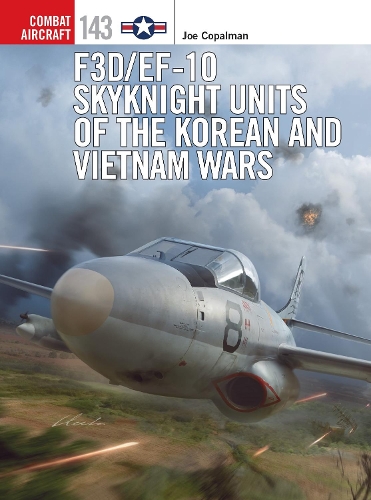
F3D/EF-10 Skyknight Units of the Korean and Vietnam Wars
(Paperback)
Publishing Details
F3D/EF-10 Skyknight Units of the Korean and Vietnam Wars
By (Author) Joe Copalman
Illustrated by Jim Laurier
Illustrated by Gareth Hector
Bloomsbury Publishing PLC
Osprey Publishing
1st March 2022
20th January 2022
United Kingdom
Classifications
General
Non Fiction
Military history: post-WW2 conflicts
358.43
Physical Properties
Paperback
96
Width 184mm, Height 262mm, Spine 6mm
320g
Description
The Douglas F3D Skyknight was an early but effective attempt at combining new technologies together in a lethal package capable of shipboard operation. Whereas most fighters relied on speed and maneuverability, the portly, straight-winged F3D relied on three radars, four 20mm cannon, and most importantly darkness. Having first flown in March 1948, the Skyknights first taste of war came in September 1952, when Marine Night Fighter Squadron 513 [VMF(N)-513] deployed to Korea. The most important job assigned to VMF(N)-513 was the escorting of USAF B-29 bombers over northern Korea. Whereas Chinese and North Korean MiG-15s relied on ground-controlled intercept radar for steering guidance into firing positions, the F3D, with its own onboard radars, was autonomously lethal it could detect, track and target MiGs all on its own. Skyknight crews ended the Korean War with six nocturnal kills in exchange for one combat loss. After the war, 35 Skyknights were converted into electronic warfare (EW) aircraft. As US air operations over North Vietnam intensified in early 1965, the need for a tactical EW jet to provide electronic countermeasures (ECM) protection to accompany strike packages north became apparent. For all of its early effectiveness over North Vietnam, the proliferation of radar-guided guns and missiles began to erode the advantage created by EF-10 escort support, which flew its last combat mission in October 1969. This highly illustrated volume explores the F3D Skynights and their deployment during the Korean and Vietnam wars, using first-hand accounts from aircrew, original photographs and 30 profile artworks to explore their key roles as an escort aircraft and electronic warfare aircraft.
Author Bio
Joe Copalman has been writing on contemporary and historical military aviation since 2013, emerging as one of the leading experts on US Marine Corps Aviation. Joe has written for Air International, AirForces Monthly, Aviation News and Combat Aircraft. Jim Laurier is a native of New England, growing up in New Hampshire and Massachusetts. He has been drawing since he could hold a pencil and throughout his life he has worked in many mediums creating artwork on a variety of subjects. He has worked on the Osprey Aviation list since 2000 and in that time he has produced some of the finest artwork seen in these volumes. He has specialised in aircraft of the Korean and Vietnam War period.
